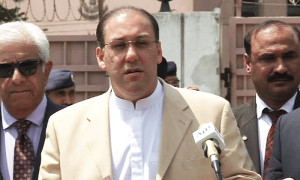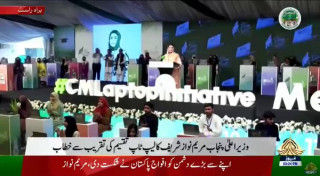RiazHaq
Senator (1k+ posts)
Over 1.5 million smartphones and an equal number of 3G subscriptions are being purchased every month in Pakistan, according to data released recently. The number of broadband subscriptions has more than quadrupled from under 4 million in 2013-14 to nearly 17 million in 2014-15 as a result of 3G and 4G rollout in the country last year, according to data released by Pakistan Telecommunications Authority.
[TABLE="class: tr-caption-container"]
[TR]
[TD="align: center"]
 [/TD]
[/TD]
[/TR]
[TR]
[TD="class: tr-caption, align: center"]Broadband Subscription Data. Source: PTA[/TD]
[/TR]
[/TABLE]
3G/4G Expansion:
3G/4G subscriptions in Pakistan soared to 13.49 million, up from 9.83 million in May, according to data from Pakistan Telecommunications Authority (PTA). Telenor led the 3G/4G market with over 4.16 million subscribers, followed by Mobilink (3.65 million 3G subscribers), CMPak (3 million 3G/4G subscribers, and Ufone (2.57 million 3G subscribers). Warid had 106,211 LTE network subscribers at end of June. These carriers have laid thousands of kilometers of fiber to support 3G services. Mobilinkalone has fiber optic network that currently spans over 8,000 kilometers.
Soaring Smartphone Sales:
Monthly smartphone sales in Pakistan are averaging 1.5 to 2 million, according to a publication named Mobile Payments Today. Over 70% of these new smartphones are based on Google's Android operating system. Rapid growth in smartphones in the country has attracted Chinese company Haier to set up a factory in Lahore to take advantage of the opportunity.
Mobile Broadband Apps:
Several operators are now offering 3G 4G mobile broadband connectivity in over 200 cities and towns across Pakistan. The ubiquity of access is laying the foundation forPakistan 2.0 with a wide range of apps to improve the lives of Pakistanis. Such apps are starting to appear for education, health care, social networking, ride-sharing, banking, e-commerce, government services, etc.
It is also bringing in mobile payments companies to allow consumers to pay using direct carrier billing. Centili, a mobile payments processor, has announced its plans to work with Mobilink, Telenor, Zong, Ufone, and Warid, which have a combined 136 million subscribers in Pakistan.
Summary:
Expansion of mobile broadband and increasing sales of smartphones are beginning to help stimulate Pakistan's economy, as are the increasing cement sales from both private and public sector.
Construction work on China-Pakistan Economic Corridor (CPEC) is stimulating economic activity in Pakistan as indicated by rising domestic cement demand in the country. It was up 8% year over year in 2014-15. Cement sales are considered a barometer of development activity. A recent assessment by Ruchir Sharma, head of Morgan Stanley's emerging markets, has said Pakistan's economy is growing more than twice as fast as emerging markets other than India and China. In a piece titled "Bucking stagnation elsewhere, the quiet rise of South Asia", Sharma particularly mentions the Chinese CPEC investment of $46 billion as a positive for Pakistan. "Pakistan’s manufacturing sector is now growing, due to both increasing electric output and the fact that – like Bangladesh – its young population and labour force is expected to continue expanding for at least the next five years", says Sharma.
http://www.riazhaq.com/2015/08/smartphone-sales-and-mobile-broadband.html
[TABLE="class: tr-caption-container"]
[TR]
[TD="align: center"]

[/TR]
[TR]
[TD="class: tr-caption, align: center"]Broadband Subscription Data. Source: PTA[/TD]
[/TR]
[/TABLE]
3G/4G Expansion:
3G/4G subscriptions in Pakistan soared to 13.49 million, up from 9.83 million in May, according to data from Pakistan Telecommunications Authority (PTA). Telenor led the 3G/4G market with over 4.16 million subscribers, followed by Mobilink (3.65 million 3G subscribers), CMPak (3 million 3G/4G subscribers, and Ufone (2.57 million 3G subscribers). Warid had 106,211 LTE network subscribers at end of June. These carriers have laid thousands of kilometers of fiber to support 3G services. Mobilinkalone has fiber optic network that currently spans over 8,000 kilometers.
Soaring Smartphone Sales:
Monthly smartphone sales in Pakistan are averaging 1.5 to 2 million, according to a publication named Mobile Payments Today. Over 70% of these new smartphones are based on Google's Android operating system. Rapid growth in smartphones in the country has attracted Chinese company Haier to set up a factory in Lahore to take advantage of the opportunity.
Mobile Broadband Apps:
Several operators are now offering 3G 4G mobile broadband connectivity in over 200 cities and towns across Pakistan. The ubiquity of access is laying the foundation forPakistan 2.0 with a wide range of apps to improve the lives of Pakistanis. Such apps are starting to appear for education, health care, social networking, ride-sharing, banking, e-commerce, government services, etc.
It is also bringing in mobile payments companies to allow consumers to pay using direct carrier billing. Centili, a mobile payments processor, has announced its plans to work with Mobilink, Telenor, Zong, Ufone, and Warid, which have a combined 136 million subscribers in Pakistan.
Summary:
Expansion of mobile broadband and increasing sales of smartphones are beginning to help stimulate Pakistan's economy, as are the increasing cement sales from both private and public sector.
Construction work on China-Pakistan Economic Corridor (CPEC) is stimulating economic activity in Pakistan as indicated by rising domestic cement demand in the country. It was up 8% year over year in 2014-15. Cement sales are considered a barometer of development activity. A recent assessment by Ruchir Sharma, head of Morgan Stanley's emerging markets, has said Pakistan's economy is growing more than twice as fast as emerging markets other than India and China. In a piece titled "Bucking stagnation elsewhere, the quiet rise of South Asia", Sharma particularly mentions the Chinese CPEC investment of $46 billion as a positive for Pakistan. "Pakistan’s manufacturing sector is now growing, due to both increasing electric output and the fact that – like Bangladesh – its young population and labour force is expected to continue expanding for at least the next five years", says Sharma.
http://www.riazhaq.com/2015/08/smartphone-sales-and-mobile-broadband.html
Last edited by a moderator:

































